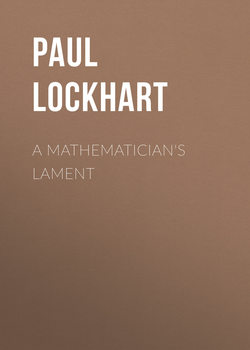Читать книгу A Mathematician's Lament - Paul Lockhart - Страница 6
На сайте Литреса книга снята с продажи.
ОглавлениеForeword
IN LATE 2007, AN AUDIENCE MEMBER AT A TALK I gave handed me a 25-page typewritten document called A Mathematician’s Lament, saying he thought I might like it. Written by a mathematics teacher called Paul Lockhart, the essay had been circling somewhat erratically through the mathematics education community since its author first wrote it in 2002, but it had never been published. The audience member’s prediction turned out to be an understatement. I loved it, and felt that the words of this Paul Lockhart—whoever he was—deserved a much wider audience. And so I did something I have never done before, and probably never will again: after tracking down the essay’s author—not entirely straightforward since the essay bore no contact information—and securing his permission, I devoted an entire issue of my monthly online column “Devlin’s Angle” on the Mathematical Association of America’s web-zine MAA Online (www.maa.org) to reproducing the entire essay in its original form. It was the quickest and most effective way I knew to get it in front of the mathematics and mathematics education communities.
When A Mathematician’s Lament appeared in my March 2008 column, I introduced it with these words:
It is, quite frankly, one of the best critiques of current K-12 mathematics education I have ever seen.
I was expecting a strong response. What ensued was a firestorm. Paul’s words struck a very, very loud chord that resonated around the world. In addition to many emails expressing appreciation, requests flooded in—many to me, since by agreement I did not publish Paul’s contact information—for reproduction and translation rights. (The volume you have in your hands arose in precisely this way.)
It wasn’t that Paul was saying something that countless mathematicians and math teachers have not said before. Nor were the points he raised new to those in the sometimes divided world of mathematics education who wrote to disagree with much if not all of what he wrote. What was different was the eloquence of his words and the obvious passion he injected into them. This was not just good writing; this was great writing, coming right from the heart.
Make no mistake about it, A Mathematician’s Lament, and this greatly expanded book version, is an opinion piece. Paul has strong views on how mathematics should be taught, and he argues forcefully for his approach, and against much of the status quo in today’s world of school mathematics education. What singles him out, besides his personal and captivating writing style, is that he brings to the thorny and much-debated issues of mathematics education a perspective that few others are able to draw upon. Paul is one of those very rare birds who began as an accomplished professional research mathematician, teaching students in universities, and then realized his true calling was in K-12 teaching, which is the career he has followed for many years now.
In my view, this book, like the original essay it came from, should be obligatory reading for anyone going into mathematics education, for every parent of a school-aged child, and for any school or government official with responsibilities toward mathematics teaching. You may not agree with everything Paul says. You may think his approach to teaching is not one that every teacher could successfully adopt. But you should read what he says and reflect on his words. A Mathematician’s Lament is already a recognized landmark in the world of mathematics education that cannot and should not be ignored. I am not going to tell you how I think you should respond. As Paul himself would agree, that is for every individual reader to do. But I will tell you this. I would have loved to have had Paul Lockhart as my school mathematics teacher.
KEITH DEVLIN
Stanford University
